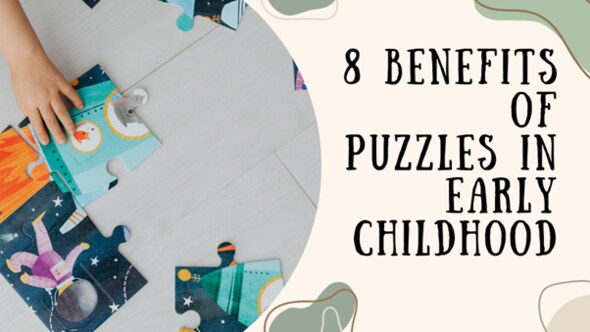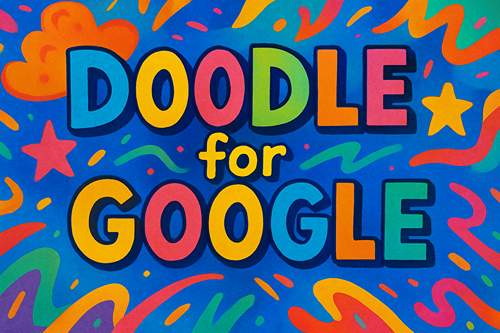8 Benefits Of Puzzles In Early Childhood
Parents and guardians want the best for their children. We aim to assist young people in their quest for knowledge and growth. It is crucial to include mental and physical exercise in their everyday routine. Children can learn a lot from puzzles.
Puzzles in early childhood education have a long history. Although they are a simplistic form of entertainment, puzzles can benefit children’s development. Recognizing the good effects of this activity can have on your child’s growth and development is crucial.
Puzzles are a dynamic and excellent educational resource for young children. It supports development of hand-eye coordination, spatial awareness, and fine motor skills. In addition to this, it improves cognitive abilities, problem-solving and analytical thinking.
Working on a crossword puzzle can encourage imagination and creativity while teaching kids the value of perseverance and patience, and working on a sudoku puzzle can help develop logical thinking and pattern recognition skills. Due to the fact that they may be done alone, with a partner, or in a group, it’s an excellent way to foster social skills.
Overall, there’s great satisfaction and a euphoric sense of achievement after solving a a crossword puzzle. Plus, it’s a fun and educational exercise for young children that fosters learning, development, and growth.”
Why Are Custom Puzzles Good for Children to Play?
Custom puzzles made from a photo can provide children with a novel and engaging puzzle experience. They enable children to create a puzzle made with a photograph with personal significance. This could be a photo of the individual, their family, friends, pets, or a significant event.
A terrific approach to involve and strengthen your relationship with your kids is through custom puzzles from a photo can encourage emotional wellbeing, strengthen connections to one’s own identity, and strengthen bonds with family.
Children have the chance to talk about the memories and tales connected to the image as they put together these personalized creations. Purchasing a personalized puzzle for your kids is a simple approach to improve the activity’s significance and everyone’s enjoyment.

1. Develop Cognitive Skills
Acquiring, processing, and analyzing information are cognitive abilities. They are the basis of learning and development and enable us to think, reason, solve problems, and make decisions. Children use their intelligence to solve problems.
Puzzles aid in children employing problem-solving and critical-thinking skills thereby fostering their development. Additionally, the activity can help children develop the capacity to recognize and visualize spatial relationships. This ability is required for reading, writing, sports, and transportation.
Puzzles play an important role in cognitive development, helping to cultivate reasoning skills in children. Jigsaw puzzles motivate children to think critically by investigating how the pieces fit together and how to create the entire image. Meanwhile, block puzzles, while in many ways similar, require children to consider how to arrange the pieces in the correct order.
The benefits do not stop at cognitive development, as they can also be used as a fun and engaging way to incorporate leisure and learning. Parents and caregivers can further enhance their child’s growth by introducing the occasional puzzle into the routine, allowing them to develop the skills necessary to succeed in school and in life. For even more convenience and versatility, the Newverest jigsaw puzzle mat roll up makes storage and setup easy, creating a tidy, portable space for play and learning.
2. Enhance Fine Motor Skills
Puzzles enhance the growth of children’s fine motor abilities. Fine motor abilities are used to grasp, manipulate, and hold objects. These muscles aid children in getting, manipulating, and assembling puzzle pieces. This activity enhances hand-eye coordination, spatial intelligence, and agility. Increasingly complexity teach children critical reasoning.
This popular hobby also makes for a special personalized gift and improve children’s memory and concentration. When solving puzzles, children must focus on the details and memorize the shapes and hues of the puzzle pieces. As they progress, they must remember which pieces fit together and where they belong. Cognitive challenges construct neuronal networks, enhancing memory, focus, and attention.
3. Improve Language and Communication Skills
Puzzles improve language and communication abilities in young children. To solve them, children must identify shapes, colors, and patterns. This enhances communication and vocabulary. Solving special problems requires collaboration so children can practice social skills such as turn-taking and idea-sharing. As the children work together to solve personalized puzzles for children, they are able to listen and convey themselves effectively.
Critical thinking is also enhanced, which is essential for developing language and communication. Putting together puzzle pieces teaches children how to scrutinize and reason. As they discover novel solutions, this can enhance their creativity and help children acquire these skills and speak fluently.
4. Boost Self-Esteem and Confidence
For many years, young children have been enjoying custom photo puzzles to relax and enjoy themselves. Children develop a high level of self-confidence and self-esteem. Children learn critical reasoning. They feel accomplished after completing a riddle. Positive feedback increases self-esteem and confidence, which can be applied in other situations.
Puzzles also provide a low-stress environment where children can make errors and learn from them. Children can surmount challenges as they complete the task and develops resilience, perseverance, and confidence through trial and error. As they work on more complex tasks, children may develop a growth mindset and view obstacles as opportunities to build.
5. Encourage Social Interaction
Puzzles for young children promote socialization. Puzzles instill teamwork and communication. To solve any perplexing tasks, children must collaborate and compromise. These activities teach children collaboration, an essential educational skill.
Through this is engaging activity children develop social skills and make pals. Personalized puzzles for kids make toddlers feel successful. This positive experience can foster connections and can help your child develop social skills and lasting friendships.
6. Improve Concentration
A puzzle is a great way for children to focus and concentrate. This endeavor requires intense commitment, which may help a child concentrate in other areas. Puzzles are enjoyable and can be completed at a child’s pace, making them a stress-free method for enhancing preceptive abilities. This helps children concentrate longer and may nurture a lifelong passion for learning.
Children are also inspired to investigate potential solutions and attempt multiple methods to solve a problem, not matter the task. This is essential for many aspects of life that requires focus and teaches children to think critically and logically. As children mature, solving puzzles aids them in overcoming real-world issues.
7. Relieve Tension
Puzzles assist kids de-stress. They can help children concentrate on the job at hand and forget about their problems. After a long day, it can help children unwind and stay calm.
Additionally, puzzles help children comprehend and govern their emotions. Children will most certainly encounter obstacles requiring perseverance and tolerance. Parents and caregivers can instruct children on deep breathing and how to remain composed during this time.
Solving puzzles helps children employ these skills in academic, social, and personal contexts. They aid children in learning, maturing, and emotional regulation.
8. Practice Colour Recognition
Learning hues through puzzles is a great way for children to learn colors. They understand color and visual perception more effectively. Children must recognize color patterns and associate colors and objects. In this way, they are more prepared for the next level of their education.
It is also believed that color recognition helps with both reading and writing. Children learn color recognition and spatial awareness. Whether at school or home, puzzles can help children develop their skills and help them learn. They provide a low-pressure, pleasant environment for learning and play.
Conclusion
The seemingly simple activity of fitting different pieces together is an excellent method of teaching kids new things. Parental participation in puzzle activities can be fun to connect with your child while fostering cognitive growth.
Remembering, there is no universal puzzle for any age group. Consequently, select ones that are suitable for your child’s age and level of development.
You can aid your child’s development of lifelong skills by including puzzle-solving in their regular activities. So, grab some puzzles and play with your kids!







